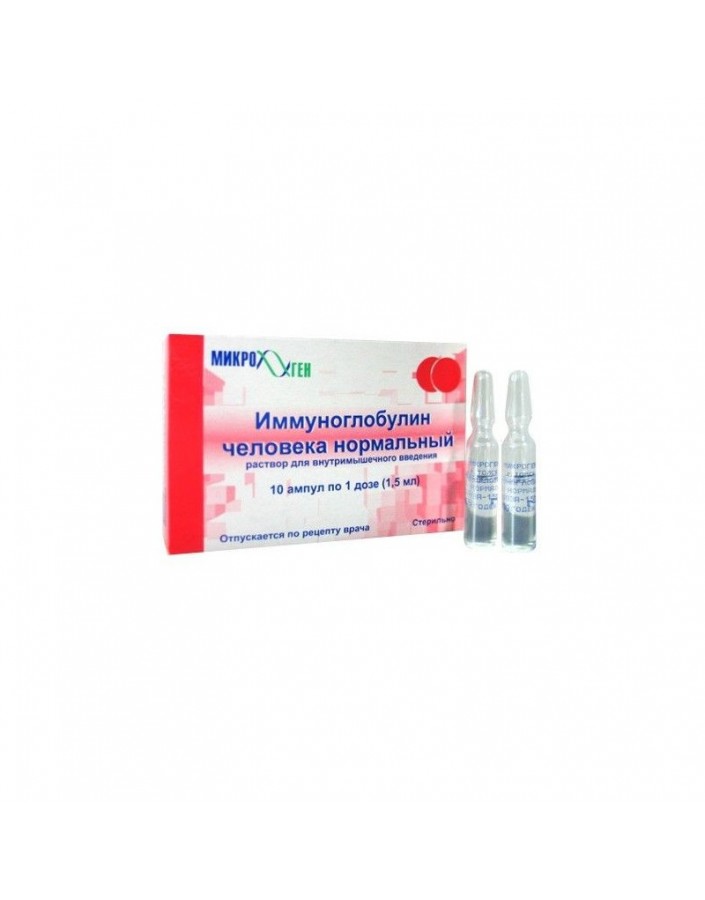




Security policy (edit with Customer reassurance module)

Delivery policy (edit with Customer reassurance module)

Return policy (edit with Customer reassurance module)
Solution for intramuscular injection
in ampoules of 1.5 ml (1 dose), in a package of 10 ampoules.
Concentrate of immunologically active protein fraction of blood plasma of healthy donors, containing antibodies of different specificity. It also has non-specific activity, which is manifested in increasing the resistance of the organism. For the manufacture of a series of immunoglobulin using plasma obtained from at least 1000 healthy donors, individually tested for the absence of the surface antigen of the hepatitis B virus (HBsAg), antibodies to hepatitis C virus and human immunodeficiency viruses HIV-1 and HIV-2.
Immunostimulating. Increases the content of antibodies in the body. With iv infusion, bioavailability is 100%. A redistribution of the drug occurs between the plasma and the extravascular space, with equilibrium being reached in about 7 days. In individuals with normal serum IgG, the biological half-life averages 21 days, while in patients with primary hypo-or agammaglobulinemia - 32 days. Contains a wide range of opsonizing and neutralizing antibodies against bacteria, viruses and other pathogens. In patients suffering from primary or secondary immunodeficiency syndromes, provides replacement of the missing IgG class antibodies, which reduces the risk of infection.
Substitution therapy for the prevention of infections in syndromes of primary immunodeficiency: agammaglobulinemia, common variable immunodeficiency associated with a- or hypogammaglobulinemia; deficiency of IgG subclasses, replacement therapy for the prevention of infections in secondary immunodeficiency syndrome due to chronic lymphocytic leukemia, AIDS in children or bone marrow transplantation, idiopathic thrombocytopenic purpura, Kawasaki syndrome (in addition to treatment with Acetylsalicylic acid preparations),severe bacterial, including sepsis (in combination with antibiotics) and viral infections, prevention of infections in premature infants with low birth weight (less than 1500 g), Guillain-Barre syndrome and chronic inflammatory demyelinating polyneuropathy, autoimmune neutropenia, partial red cell aplasia hemoprotection thrombocytopenia of immune origin, including posttransfusion purpura, isoimmune thrombocytopenia of the newborn, hemophilia caused by the formation of antibodies to coagulation factors, myasthenia gravis, prevention and treatment of infections in the treatment of cytostatics and immunosuppressants, prevention of habitual miscarriage.
Headache, nausea, dizziness, vomiting, abdominal pain, diarrhea, arterial hypo- or hypertension, tachycardia, cyanosis, shortness of breath, feeling of pressure or chest pain, allergic reactions; rarely, severe hypotension, collapse, loss of consciousness, hyperthermia, chills, increased sweating, tiredness, malaise, back pain, myalgia, numbness, hot flushes, or feeling cold.
Hypersensitivity to human immunoglobulins, especially in patients with IgA deficiency due to the formation of antibodies to it.
Most side effects are associated with a high rate of infusion and can be stopped if the infusion is stopped or slowed down. In the event of severe side effects, administration should be discontinued (epinephrine, anti-histamine drugs, corticosteroids and plasma substitutes may be indicated). In case of impaired renal function, it is recommended to monitor the condition of patients during treatment (creatin control - within 3 days after the infusion). After the introduction of immunoglobulin increases (passively) the content of antibodies in the blood, which can lead to erroneous interpretation of the results of serological research
May reduce the effectiveness of active immunization: live virus vaccines for parenteral use should not be used for at least 30 days after the administration of immunoglobulin.
The drug is stored and transported at a temperature of from 2 to 8 ° C. Freezing is not allowed.